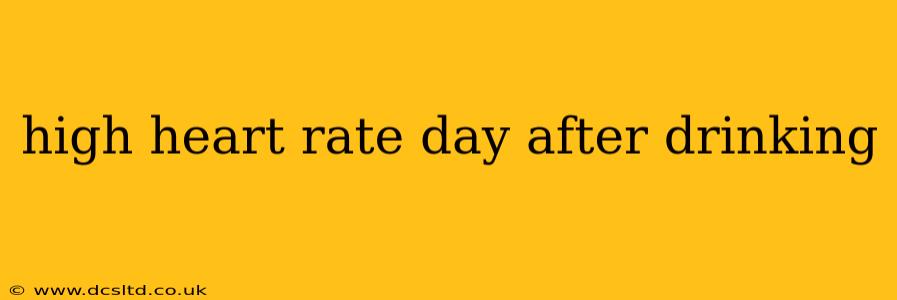Waking up with a racing heart after a night of drinking is a common experience, but it's important to understand why this happens and when it warrants concern. A slightly elevated heart rate is often nothing to worry about, but a significantly high heart rate could indicate a more serious issue. This article will explore the reasons behind a high heart rate after drinking, address common concerns, and provide guidance on when to seek medical attention.
Why Does My Heart Rate Increase After Drinking Alcohol?
Alcohol's impact on your cardiovascular system is multifaceted. It acts as a central nervous system depressant, initially causing relaxation, but it can also disrupt the delicate balance of your body's natural rhythms. Here's how:
-
Dehydration: Alcohol is a diuretic, meaning it increases urination and can lead to significant dehydration. Dehydration reduces blood volume, forcing your heart to work harder to circulate blood, resulting in a faster heart rate.
-
Electrolyte Imbalance: Alcohol consumption can disrupt the balance of electrolytes like potassium and magnesium, which are crucial for proper heart function. An imbalance can lead to irregular heartbeats and increased heart rate.
-
Sleep Disruption: Alcohol may initially induce sleep, but it often disrupts sleep patterns later in the night, leading to poor-quality rest. Lack of sleep can independently elevate your heart rate.
-
Direct Cardiac Effects: While less common, excessive alcohol consumption can directly affect the heart muscle, potentially leading to irregular heart rhythms and increased heart rate, especially in individuals with pre-existing heart conditions.
How Long Does a High Heart Rate After Drinking Last?
The duration of an elevated heart rate after drinking alcohol varies depending on several factors, including the amount consumed, individual metabolism, overall health, and hydration levels. For most people, a slightly elevated heart rate resolves within a day or two with adequate hydration and rest. However, if the high heart rate persists for longer than 24-48 hours or is accompanied by other symptoms (discussed below), medical attention is recommended.
What Are the Symptoms of Alcohol-Induced Cardiac Issues?
While a slightly elevated heart rate is relatively common, certain symptoms warrant immediate medical attention:
- Rapid or Irregular Heartbeat (Palpitations): Feeling your heart pounding, fluttering, or skipping beats.
- Chest Pain or Discomfort: Any pain, pressure, tightness, or discomfort in your chest.
- Shortness of Breath: Difficulty breathing or feeling winded.
- Dizziness or Lightheadedness: Feeling faint or unsteady.
- Swelling in Legs or Ankles: Noticeable swelling that could indicate fluid retention.
Is a High Heart Rate After Drinking Always Serious?
No, a slightly elevated heart rate after drinking alcohol isn't always serious, particularly if it resolves quickly and isn't accompanied by other symptoms. However, it's crucial to pay attention to your body and seek medical advice if you experience persistent or severe symptoms.
When Should I See a Doctor About a High Heart Rate After Drinking?
You should seek immediate medical attention if you experience a high heart rate accompanied by any of the symptoms mentioned above, or if your elevated heart rate persists for more than 48 hours. Don't hesitate to contact your doctor or seek emergency medical care if you're concerned.
Can Certain Medications Increase Heart Rate When Combined With Alcohol?
Yes, some medications can interact with alcohol to increase heart rate or worsen other cardiovascular effects. Always consult your doctor or pharmacist about potential interactions between your medications and alcohol. This is especially crucial for medications affecting heart rhythm or blood pressure.
How Can I Prevent a High Heart Rate After Drinking?
Moderation is key. Limiting alcohol consumption, staying well-hydrated, and getting adequate sleep can significantly reduce the risk of experiencing a high heart rate after drinking. Maintaining a healthy lifestyle overall, including regular exercise and a balanced diet, also contributes to better cardiovascular health.
Disclaimer: This information is for educational purposes only and should not be considered medical advice. Always consult with a healthcare professional for any concerns about your health.
